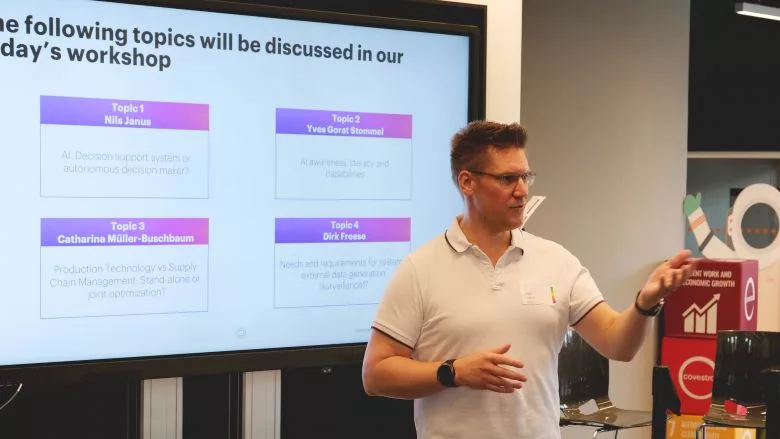Covestro, Evonik, and Accenture Attend a Peer Exchange on Artificial Intelligence

What do experts from the chemical industry think about AI? Covestro, Evonik and Accenture gathered top minds at the "Chemicals Peer Exchange" to discuss opportunities and challenges. Among them was Nils Janus, Head of Advanced Analytics at Covestro. Courtesy of Covestro.
The chemical industry is discovering a growth of possibilities for the use of artificial intelligence (AI) to increase efficiency and sustainability in their production. However, the use of AI presents challenges that have yet to be solved. For this reason, Covestro, Evonik, and Accenture invited managers from production and technology divisions of Bayer, Clariant, Wacker, Shell, Lanxess, and other companies to a two-day Chemicals Peer Exchange. It was the fourth time such an exchange has been organized.
"For me, the chemical industry is predestined for the use of AI because we have a lot of complex processes going on that cannot be described by fixed rules," said Walter Grüner, head of IT & Digitalization at Covestro. "They are not suitable for automation. We rather need learning systems to which we grant a certain degree of decision-making autonomy. In doing so, we focus primarily on the development of systems that work in a complementary manner to humans and support their abilities."
With the introduction of AI in the chemical industry, questions about technical, operational, and organizational implementation continue to emerge. This includes, for example, the role of AI in decision-making, AI awareness, literacy, and capabilities, and monitoring needs. During the two-day Chemicals Peer Exchange, the participants discussed the opportunities of AI systems for the chemical industry in addition to their questions and concerns.
"It is precisely the exchange across company boundaries that helps us a lot in the upcoming transformation because overall challenges become clearer," said Nils Janus, global head of Advanced Analytics at Covestro. "This increases efficiency and saves time."
Overall, there was agreement among the participants: Artificial intelligence offers great opportunities for the chemical industry. The new systems help to create a common ecosystem for cross-divisional production planning. It must be decided on a case-by-case basis, and each company must decide individually and independently how much autonomy these systems will be given. Regarding access to the systems, the participants saw a strong democratization of artificial intelligence. Companies could support employees in learning more about data and AI and bring them into contact with experts when it comes to the widespread use of AI solutions in the company. The generation and dissemination of Environmental, Social and Governance (ESG) data is currently the biggest driver for using external data sources. Here, all participants saw opportunities to intensify the use of external sources.
To learn more, visit www.covestro.com,www.evonik.com, and www.accenture.com.
Looking for a reprint of this article?
From high-res PDFs to custom plaques, order your copy today!





